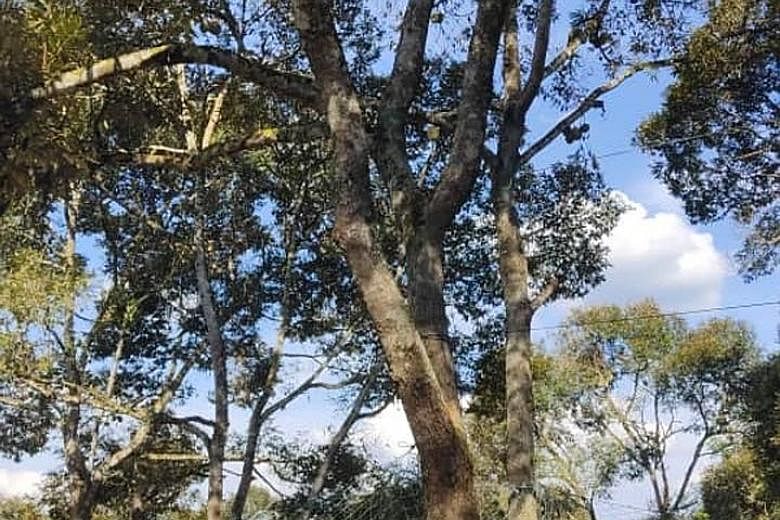Eager buyers converged on the lorry, loaded with durians in large 50kg baskets, as soon as it stopped in front of Mr Michael Siow's hardware store in Balestier Road on July 14.
For Mr Siow, 54, it is the first harvest from his new durian venture - Titi Durian - to be sold in Singapore, two years later than planned due to the pandemic.
The permanent resident has invested over $300,000 in the Singapore business, and much more in his plantations back home in Malaysia.
Unlike most other durian wholesalers and retailers here, the businessman owns part of the plantations that supply Titi Durian, named after his Negeri Sembilan home town.
It is rare for someone involved in durian sales and distribution here to invest directly in plantations. Most buy from wholesalers or plantations instead.
Mr Siow said: "Probably 99 per cent of wholesalers and retailers in Singapore don't have their own plantations."
He said Titi is a small area and people mostly own small plots. So, they lack the scale to export the fruit themselves economically.
In contrast, Mr Siow owns about 28ha to 32ha, split into several plots in the area.
Even then, only about a third of the supply is covered by his own harvest daily.
The rest, about two tonnes' worth, has to be bought from neighbouring plantations.
It is a similar story for 99 Old Trees, a durian store in Owen Road. Singaporean Kelvin Tan, who manages it, said one of his business partners is a Malaysian who inherited a durian plantation in Raub, Pahang, from his family.
About 15 per cent to 20 per cent of 99 Old Trees' supply comes from that nearly 11ha farm.
Raub is known for being prime Musang King territory. Plantation land there attracts a premium - around RM600,000 (S$193,000) for about 0.4ha even before planting anything, said Malaysian plantation developer Tan Hwa Chuan, 48.
Mr Kelvin Tan said: "A good plantation requires a lot of luck as there are many factors at play: A gentle slope, adequate water and quality soil are needed."
Yet water must not accumulate around the trees. The delicate balance makes durian one of the hardest crops to grow, he said.
He added that challenges abound for prospective investors, and they need to do their due diligence before ploughing in money.
Challenges include the long time for trees to bear fruit - between three and five years. Even then, quality may vary and the trees are temperamental.
"There are trees that just don't survive. They are also easily trampled on by animals."
Still, for both Mr Kelvin Tan, 37, and Mr Siow, cutting out the middleman with their own investments increases quality control, while keeping prices affordable.
For instance, a 400g box of Musang King costs about $20 from Mr Siow. A similar box could cost up to double that from popular retailers who have to source their durians from wholesalers, he noted.
Both Mr Kelvin Tan and Mr Siow said those planning to invest in durian plantations need to be aware of the challenges in cultivating durian trees.
Nonetheless, Mr Tan Hwa Chuan is bullish about durian investment. The Malaysian is a director of Sindiyan BIG Agro, a subsidiary of plantation company Sindiyan Group.
The group is developing a roughly 3,640ha durian plantation in Gua Musang, Kelantan - the largest in Malaysia.
He said durian plantations offer a great opportunity for property developers and private equity firms, due to the growing appetite for durian consumption and agro-tourism in China.
"Currently, only about 5 per cent of Malaysia's total durian production is exported, and Malaysia makes up only 1.4 per cent of China's total durian import. Thailand exports inferior durians to China but has a larger market share."
Mr Tan Hwa Chuan noted that foreigners generally cannot own Malaysian agricultural land. Section 433B of the Malaysian land code prohibits foreign ownership of agricultural land.
However, there are still ways for Singaporeans to get in on the action. "A Singaporean may first set up a company that processes durians, before using the company to sign a private lease for plantation land," said Mr Tan Hwa Chuan.
"A Singaporean fruit seller could also enter a joint venture with a plantation owner, and that would also help the seller 'lock up' some of their durian supply."
Singapore imported 16,700 tonnes of the fruit last year, of which 89 per cent came from Malaysia, according to the Singapore Food Agency. The rest came from Thailand and the Philippines. Imports this year up to the end of last month weigh in at 9,300 tonnes.


